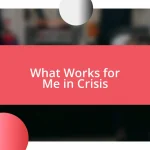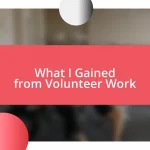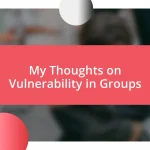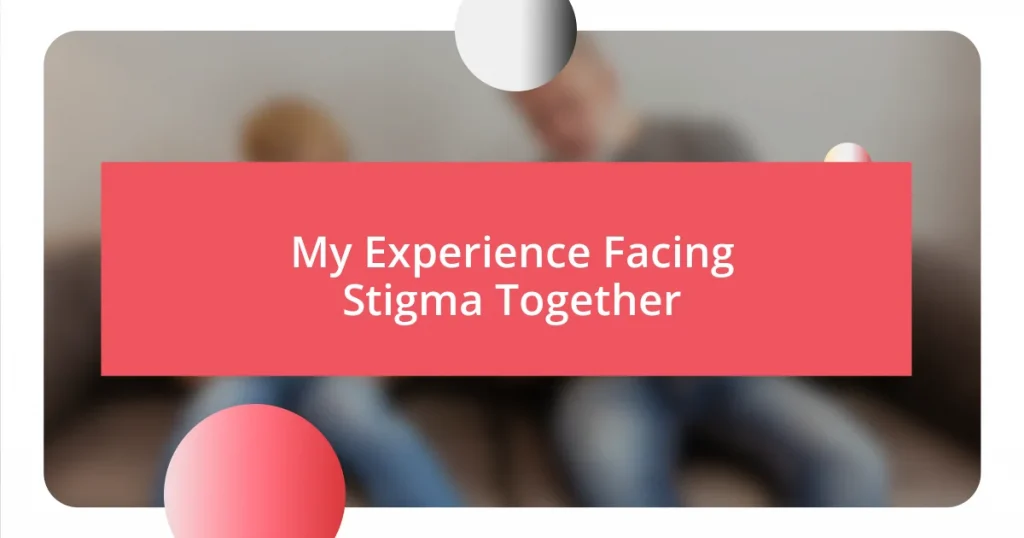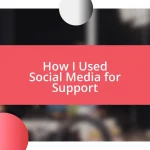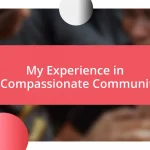Key takeaways:
- Stigma can isolate individuals and hinder open communication, making understanding and empathy crucial for fostering a supportive community.
- Building a support network and engaging in open dialogues can empower individuals to confront stigma, share experiences, and find validation.
- Advocacy and storytelling not only empower the speaker but also create opportunities for connection, healing, and transformation within the community.
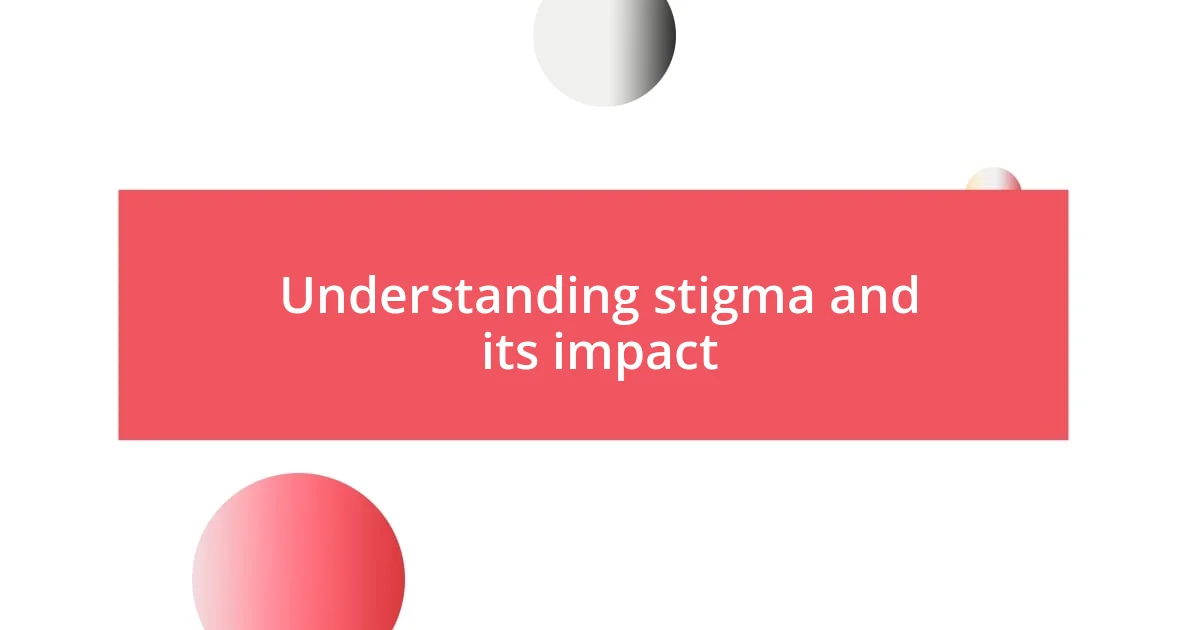
Understanding stigma and its impact
Stigma often acts as a heavy cloak that wraps around individuals, suffocating their voices and experiences. I remember a time when I felt reluctant to share my story, fearing the judgment from those around me. It made me wonder—how many others are silenced by the fear of stigma, missing out on the support they desperately need?
The emotional weight of stigma can be crippling. I recall a moment when I shared my struggles in a group, only to notice the awkward silence that followed. The unspoken questions hung in the air, making me feel isolated. It’s a painful reminder that stigma not only affects how we see ourselves but also shapes how we connect with others.
Understanding stigma is crucial. It reduces our ability to empathize with those who are suffering; they become shadows in a world that only sees labels. Have you ever watched someone retreat into themselves after an insensitive comment? It’s heart-wrenching. Recognizing the impact of stigma is the first step toward fostering a more compassionate community where everyone feels valued and seen.
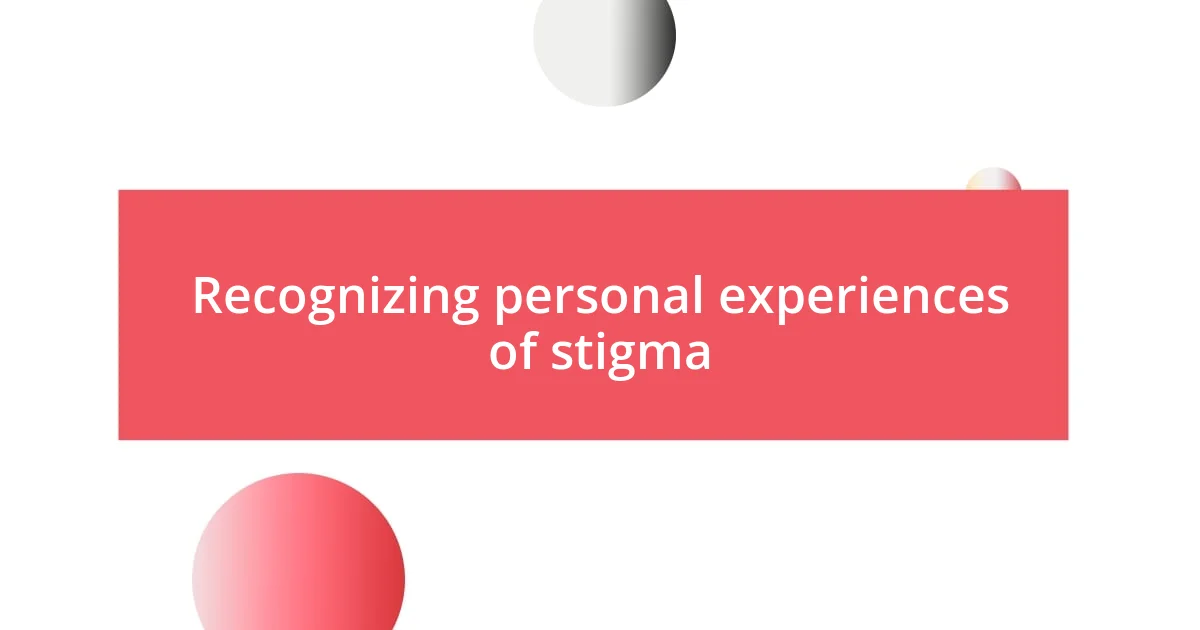
Recognizing personal experiences of stigma
When I reflect on my own encounters with stigma, I realize how subtle yet profound those moments can be. I’ll never forget sitting at a café, trying to engage with friends while a comment slipped out, “You’re just overthinking it, it’s not that big of a deal.” In that instance, I felt a wave of shame wash over me, as if my feelings weren’t valid, simply because they didn’t fit into someone else’s understanding of my situation. It’s a stark reminder that stigma often thrives in misunderstandings, leaving individuals battling not only their struggles but also the skewed perceptions of those around them.
Recognizing stigma in personal experiences can often start with small, everyday moments. Here are a few insights that illustrate this:
- Isolation: I sometimes felt like I was on an island, surrounded by a sea of misunderstanding—unable to reach out for help.
- Fear of Vulnerability: Sharing my story often felt like standing naked in a crowd, inviting judgment instead of empathy.
- Silenced Voice: In groups where I craved connection, my voice sometimes felt muted, suffocated by the stigma that loomed over those discussions.
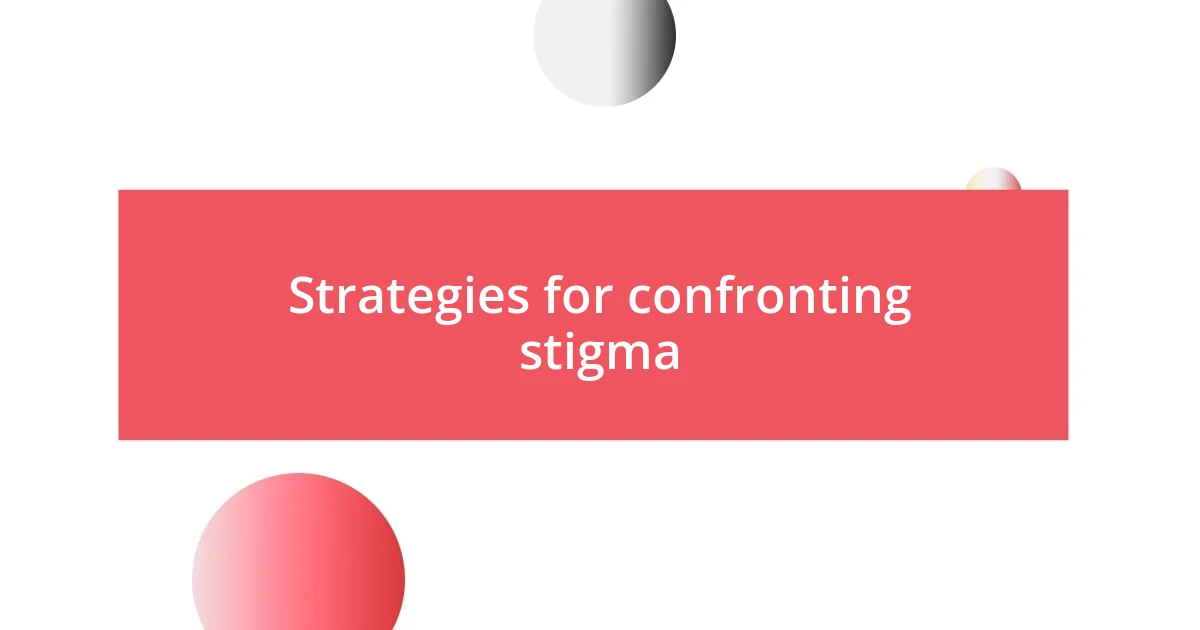
Strategies for confronting stigma
Stigmas can be daunting, but confronting them head-on is a powerful strategy. One approach that I’ve found particularly effective is to cultivate open dialogues. I once attended a workshop where we discussed our experiences openly; it was liberating. By sharing our truths, we created an environment of understanding, allowing empathy to flourish. Have you ever noticed how conversation can break down barriers? It certainly did for us.
Another practical strategy involves educating others about the issues we face. I vividly remember explaining to a close friend how their seemingly harmless comments affected me. Their face lit up with realization, and from that moment, they became a compassionate ally. In my experience, knowledge is a catalyst for change. When we articulate the impacts of stigma, we invite empathy and allyship rather than judgment.
Finally, supportive communities play a critical role in dealing with stigma. I recount my time in an online support group where we shared coping strategies and experiences. The sense of belonging was incredibly uplifting. If you’re ever in doubt about where to turn, seek out communities that resonate with you. They become safe havens, empowering you to confront stigma in a meaningful way.
| Strategy | Description |
|---|---|
| Open Dialogues | Create an environment where experiences are shared openly to foster understanding. |
| Education | Inform others about the effects of stigma to cultivate empathy and support. |
| Supportive Communities | Engage with groups that provide acceptance and encouragement to face stigma together. |
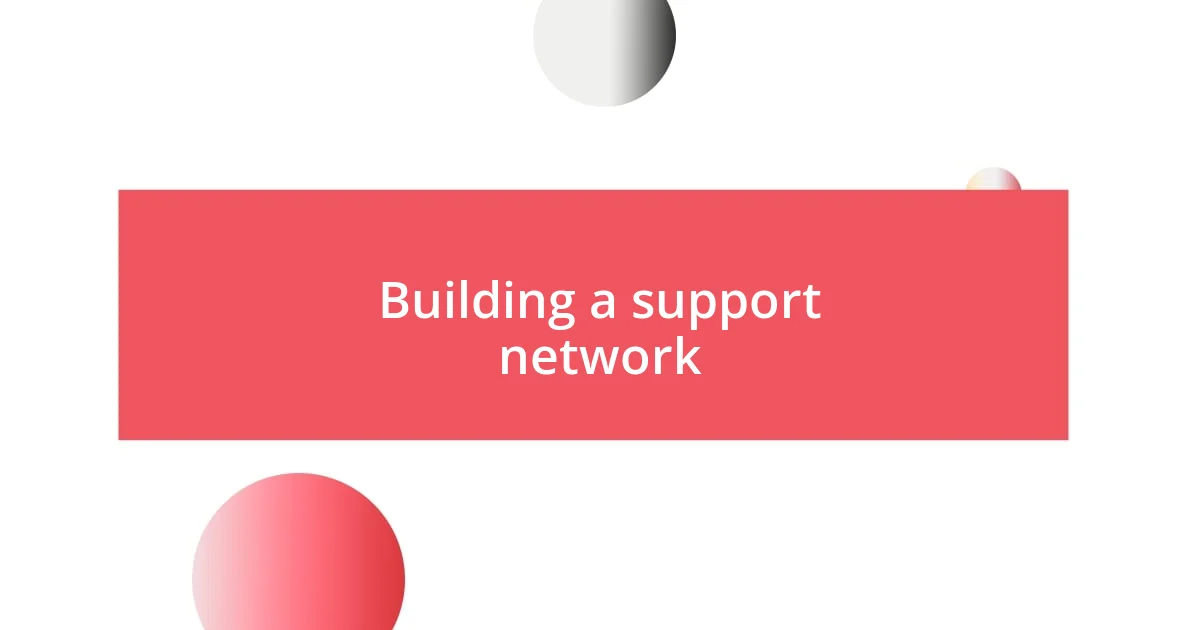
Building a support network
Building a support network can feel intimidating, yet it has been a game-changer for me. I remember joining a local meetup group focused on mental well-being. Stepping into that room, I was filled with anxiety, but as I shared my story, I felt a warm acceptance wash over me that I hadn’t experienced in a long time. Isn’t it amazing how a simple gathering can foster such connection?
One of the most profound aspects of these networks is the diversity of experiences people bring to the table. I once met a fellow participant who had faced similar struggles. Hearing their story not only validated my feelings but also ignited a sense of camaraderie. It made me realize that we are not alone in our battles—how empowering it is to know that others understand your pain and stand with you, shoulder to shoulder!
As I reflect on these connections, I truly believe that trust is the cornerstone of a robust support network. I’ve found that being vulnerable invites others to be open as well. The moments I’ve shared my fears often led to someone else bravely revealing their own. It builds a circle of support fueled by sincerity. Have you pondered how such honesty could change the dynamics of your relationships? When we allow ourselves to let down those walls, we unlock the potential for healing and collaboration.
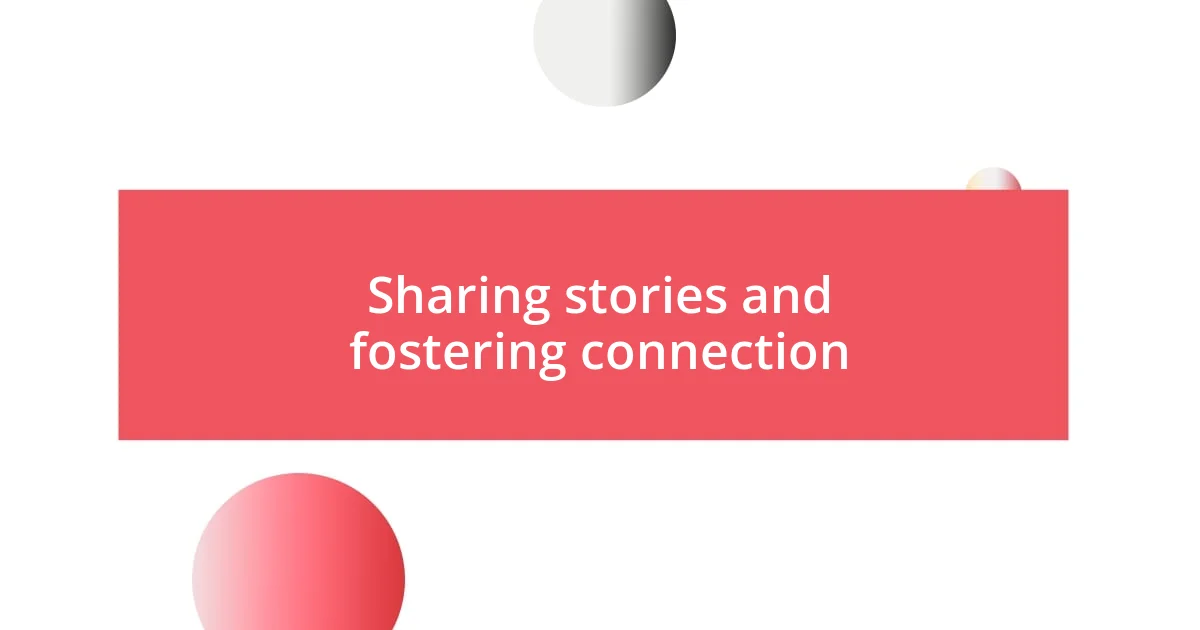
Sharing stories and fostering connection
Sharing our stories can create bridges where once there were walls. I recall a powerful moment during a community event when individuals took turns sharing their experiences. Each tale was unique, yet there was an unmistakable thread of shared understanding weaving through them. It struck me how much we connected in those moments—can you imagine how transformative that is for personal healing?
When we openly disclose our truths, we not only inspire empathy in others but also find strength in our vulnerabilities. I remember confiding in a group about a particularly tough time in my life, and how someone immediately reached out, sharing their own struggle. This unguarded exchange fostered a sense of unity that was palpable. Have you ever experienced that moment of connection when someone truly “gets” you? It’s like discovering kindred spirits in unexpected places.
Moreover, the act of storytelling is therapeutic for both the speaker and the listener. Reflecting on my experiences allows me to process my emotions, while listening to others provides fresh perspectives. I often wonder how many life-changing insights could be gained if we simply took the time to listen more deeply to each other. Sharing stories really can be the balm that soothes the wounds left by stigma, reminding us we are not alone on this journey.
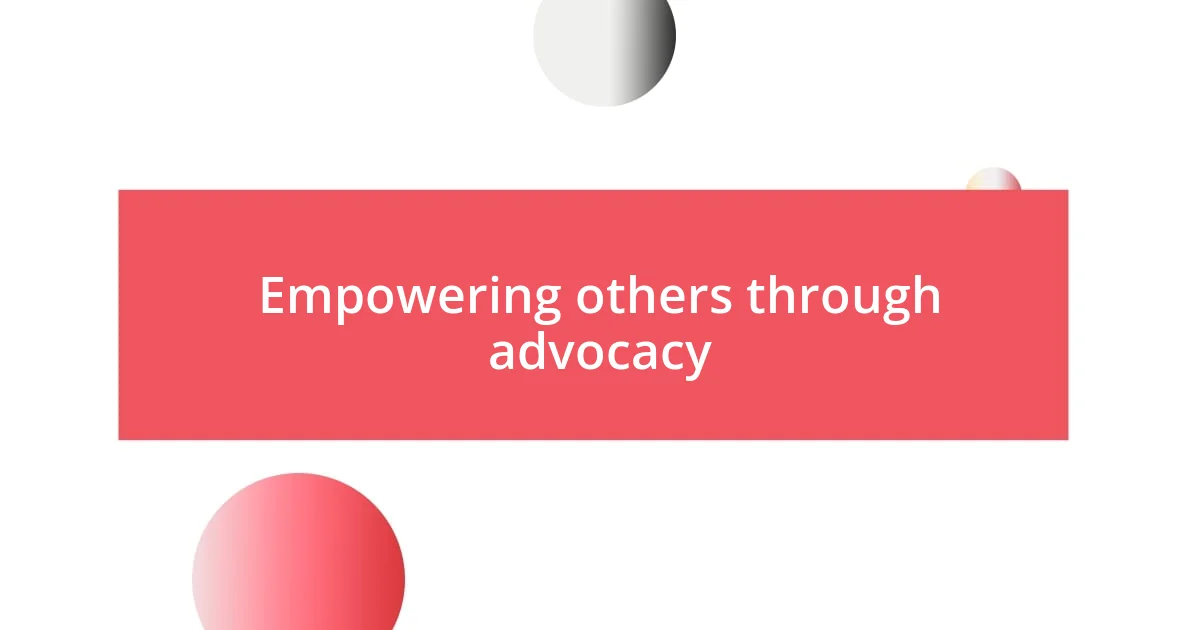
Empowering others through advocacy
Advocacy works wonders in empowering others, and I’ve witnessed its impact firsthand. I remember volunteering for an awareness campaign at my local community center. Standing in front of a crowd, sharing my story about facing stigma, I felt a rush of nervousness, yet, when I saw the nods of understanding in the audience, my voice strengthened. Isn’t it incredible how a shared experience can ignite a spark of hope in someone else’s life?
One of the most rewarding aspects of advocacy is the sense of community it fosters. I once organized a workshop where we discussed mental health resources. As people shared their struggles, one young woman spoke up, expressing how hearing our stories gave her the courage to seek help for the first time. Can you imagine what that shift in perception can do for someone feeling isolated? It’s those moments that remind me why advocacy is so vital—it creates a space where healing can begin.
By stepping into the role of an advocate, we pave the way for others to find their voice. I often share with my friends that speaking out is not just about sharing my experience; it’s about giving others permission to do the same. Have you thought about how your voice could influence someone else’s path? Advocacy isn’t merely about raising awareness; it’s about creating an opportunity for transformation, both for ourselves and those around us.
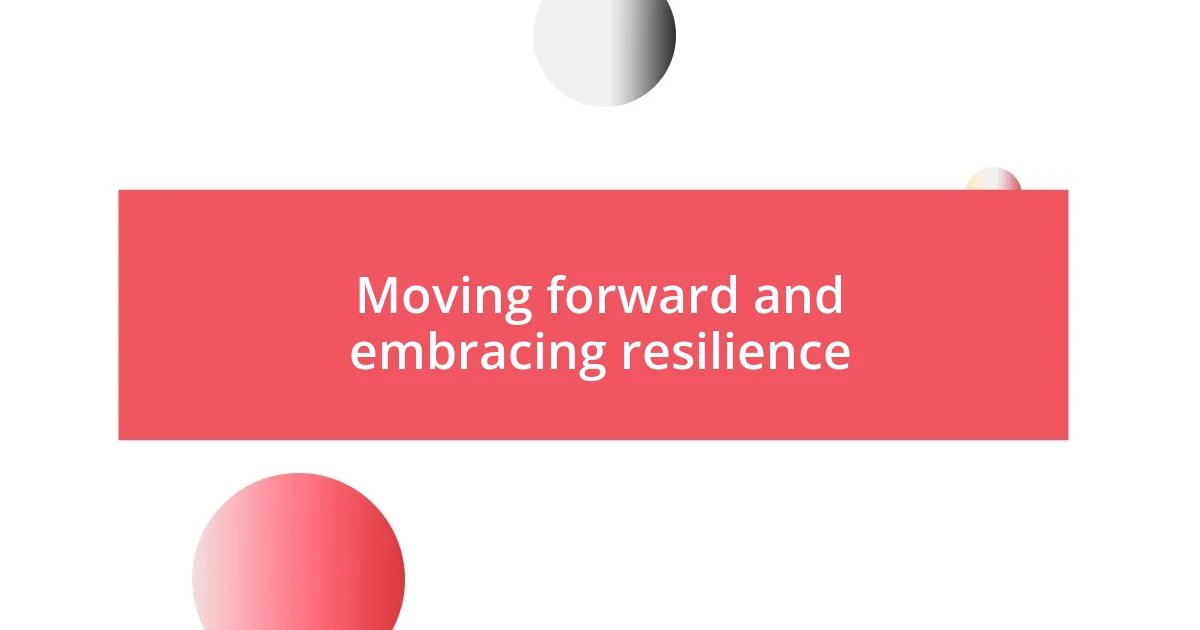
Moving forward and embracing resilience
Embracing resilience is a journey I’ve found myself on time and again. After facing the stigmas surrounding my experiences, I realized that movement often means taking small steps forward, even when the path seems daunting. I vividly remember a moment when I decided to participate in a local support group. Initially, I was apprehensive, but as I shared my story, I felt the weight of shame begin to lift. Have you ever felt that sense of liberation when you finally let go of your burdens?
Resilience isn’t just about bouncing back; it’s about understanding that setbacks are an essential part of growth. There have been instances when I’ve stumbled after making progress, feeling defeated and questioning my journey. Yet, in those moments, I learned to lean into my emotions rather than run from them. For example, during a particularly rough patch, I began journaling my thoughts, which helped me process feelings that previously held me captive. I often ask myself—what if those moments of vulnerability are opportunities for deeper strength?
As I look back, I see that resilience flourishes within a supportive environment. Surrounding myself with uplifting individuals made all the difference. I remember reaching out to a mentor who encouraged me to share my challenges openly. That simple act of seeking support sparked discussions about our shared struggles, which ultimately fortified our resilience. Isn’t it powerful to think that connecting with others can become a source of strength when facing life’s hurdles?
